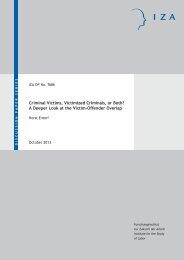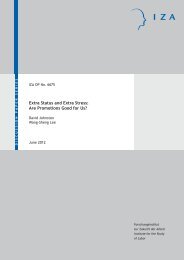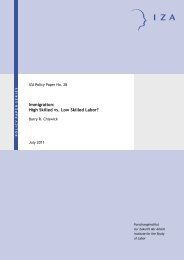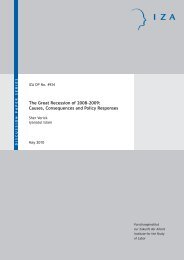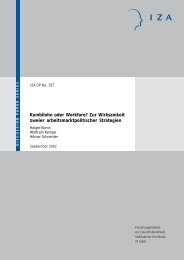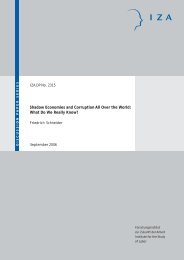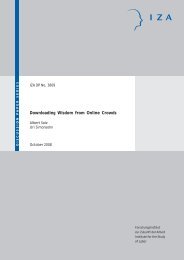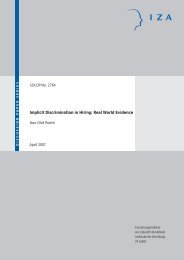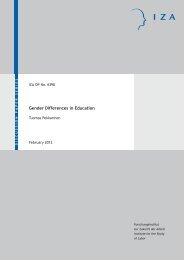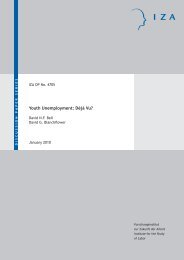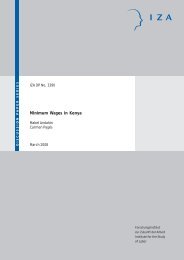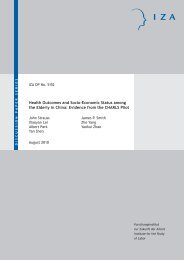Limited Self-Control, Obesity and the Loss of ... - Index of - IZA
Limited Self-Control, Obesity and the Loss of ... - Index of - IZA
Limited Self-Control, Obesity and the Loss of ... - Index of - IZA
Create successful ePaper yourself
Turn your PDF publications into a flip-book with our unique Google optimized e-Paper software.
systematically diverges from <strong>the</strong> ordering <strong>of</strong> options derived from observed behavior. The<br />
second extension is closely related to <strong>the</strong> first, <strong>and</strong> emphasizes ex post evaluations as a<br />
valuable source <strong>of</strong> information about <strong>the</strong> possibility <strong>of</strong> bounded rationality in people’s<br />
decision-making. How do people fare after <strong>the</strong>y have made decisions? Or, is some<br />
consumption pattern related to higher or lower subjective well-being, ceteris paribus? This<br />
approach is promising as it puts forward a proxy for individual welfare to evaluate choice<br />
behavior. However, <strong>the</strong> approach is subject to <strong>the</strong> same econometric difficulties faced by<br />
studies that examine <strong>the</strong> determinants <strong>of</strong> behavior, i.e. <strong>the</strong> possibility <strong>of</strong> omitted variable bias<br />
<strong>and</strong> endogeneity bias.<br />
Two recent studies develop <strong>and</strong> apply strategies to deal with <strong>the</strong> issue <strong>of</strong> endogeneity. In a test<br />
for self-control problems with smoking, Gruber <strong>and</strong> Mullainathan (2005) study <strong>the</strong> effect <strong>of</strong><br />
an increase in tobacco taxes on <strong>the</strong> reported happiness <strong>of</strong> people who are predicted to be<br />
smokers. Contrary to <strong>the</strong> st<strong>and</strong>ard prediction, <strong>the</strong>y find that <strong>the</strong>se people are better <strong>of</strong>f as a<br />
result. Benesch et al. (2006) study <strong>the</strong> reaction to a difference in <strong>the</strong> opportunity set ra<strong>the</strong>r<br />
than a price change. It is tested whe<strong>the</strong>r <strong>the</strong> life satisfaction <strong>of</strong> heavy TV viewers is increased<br />
or reduced if <strong>the</strong>y can choose from a large number <strong>of</strong> TV channels ra<strong>the</strong>r than a small number<br />
<strong>of</strong> channels. The st<strong>and</strong>ard economic prediction would be that a larger opportunity set does not<br />
make people worse <strong>of</strong>f. With a self-control problem, more choice can make time inconsistent<br />
behavior worse. In fact, <strong>the</strong> empirical findings support <strong>the</strong> hypo<strong>the</strong>sis that limited self-control<br />
is partly responsible for <strong>the</strong> large amount <strong>of</strong> time devoted to TV viewing.<br />
Reported will power, behavioral patterns <strong>and</strong> experienced utility. In this paper, ano<strong>the</strong>r<br />
variant <strong>of</strong> <strong>the</strong> identification strategy, based on experienced utility, is applied. It is studied<br />
whe<strong>the</strong>r <strong>the</strong> ex post evaluation <strong>of</strong> some behavior systematically varies between groups <strong>of</strong><br />
people who have differing amounts <strong>of</strong> will power. For <strong>the</strong> phenomenon <strong>of</strong> obesity, it is<br />
hypo<strong>the</strong>sized that obesity makes people worse <strong>of</strong>f in terms <strong>of</strong> experienced utility if <strong>the</strong><br />
increased body mass is due to a self-control problem. However, if people are not lacking will<br />
power, a BMI above 30 does not enter negatively into <strong>the</strong> evaluation <strong>of</strong> people’s subjective<br />
well-being. Any correlation between <strong>the</strong> level <strong>of</strong> will power <strong>and</strong> subjective well-being as such<br />
is statistically captured in <strong>the</strong> constant term.<br />
Four comments serve to clarify <strong>the</strong> underlying assumptions, strengths <strong>and</strong> weaknesses <strong>of</strong> <strong>the</strong><br />
approach:<br />
8



